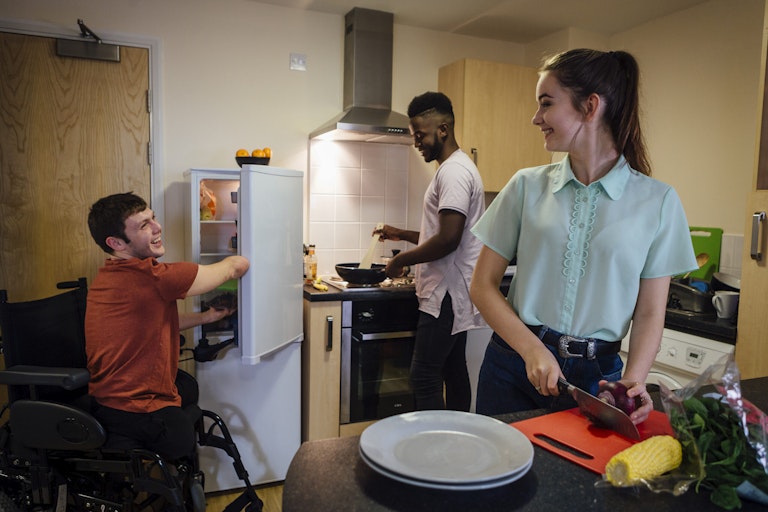3 Healthy Eating Tips for Students

Academics aren’t the only thing college and university students struggle with. Most students also have difficulty staying healthy while being so busy. Indeed, a full schedule and healthy habits can often seem at odds with one another, and students know how challenging it is to properly care for oneself when attending classes, completing assignments, working, and fulfilling social commitments. A busy schedule can especially impact when and what you eat. Luckily, there are some practical strategies you can implement to maintain healthy eating habits throughout university.
Cook and Eat at Home
Living in a residence hall, or dorms, often hinders students’ ability to prepare and eat healthy meals. Without a dedicated kitchen (or a kitchen that isn’t overrun by other students), it’s difficult to prepare any meal — yet alone a healthy one. But for most, at-home preparation is the solution to an unhealthy eating pattern. Cooking at home also saves money and helps students develop important life skills. Having a kitchen is one unique benefit of student rentals, and one of the biggest reasons why many students choose to move off campus. A private kitchen in your own residence provides the freedom you need to explore healthy cooking and eating.
Learn What Makes a Healthy Meal or Snack
It’s next to impossible to choose healthy foods without the proper understanding of wholesome eating. Unfortunately, many young adults are unsure what constitutes healthy choices. And, making healthy choices can play a significant role in planning meals and snacks. Thus, it’s essential to learn the difference between foods that are good for you, and those which you should only enjoy in moderation. To ensure your meals are as healthy as possible, aim to include the following food types in your meals and snacks:
- Wholesome grains, such as whole wheat or multigrain carbohydrates with vitamins and minerals
- High-fibre foods, including crunchy fruits and vegetables such as apples and celery
- Colouful fruits and vegetables
- The recommended amount of water, tea or low sugar, drinks (avoid energy drinks, soft drinks, and excessive amounts of coffee and alcohol)
- High-protein foods, like fish, poultry, lean meat, beans, legumes, eggs, nuts (in moderation), and seeds
- Organic milk, cheese, and yogurt
- Healthy fats, including peanut butter or other nut butters, canola oil, olive oil, and fish (especially salmon)
Enjoying these foods regularly will help you maintain a healthy, balanced diet. In between meals, you can also select healthy snacks to help keep you full and provide you with energy throughout the day. Here are some worthy options to consider:
- Vegetables and low-fat dip
- Fresh fruit
- Frozen fruit
- Trail mix without added sugar
- Cheese
- Cottage cheese (often paired with fresh fruit)
- Peanut butter
- Light popcorn
- Whole grain crackers
- Yogurt
- Low-fat hummus
- Baked tortilla chips and salsa or guacamole
Eat Balanced Meals
As with most endeavours, striking a balance is essential to healthy eating. A balanced meal contains a blend of macronutrients, including protein, healthy carbs, and small amounts of fat. This combination provides optimal nourishment and helps keep you energized throughout the day. Of course, a balanced diet isn’t just about portioning the good foods; it’s also about balancing the good with the bad. Thus, while it’s fine to indulge in a less-than-healthy meal or snack now and then, just be sure your nutritious snack or meals outweigh the others.
Ready to apply?
Tell us your apartment preferences and we will do everything we can to place you in the unit that’s best for you.
Apply Now